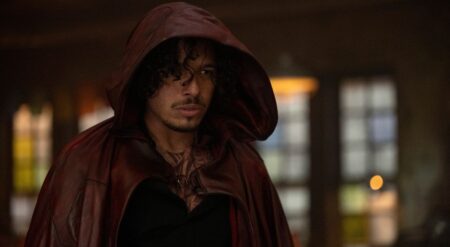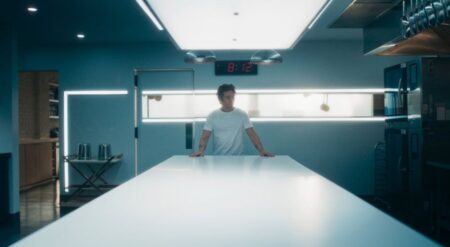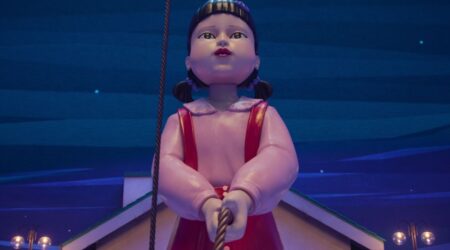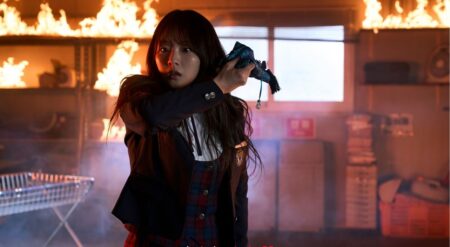If you could stick a space worm inside of your head to eat your anxiety, would you? What if that space worm could also mean the end of life as we know it? Well, prepare for a cosmic rollercoaster ride of laughter, emotion, and relatable chaos in The Second Best Hospital in the Galaxy. This sci-fi animated series, created by Cirocco Dunlap and produced by Maya Rudolph and Natasha Lyonne, takes viewers on a hilarious yet deeply introspective journey on mental health through the eccentricities of a futuristic hospital.
Dunlap’s vision for the show is evident from the outset, with each episode presenting a new and bizarre sci-fi illness for the hospital staff to grapple with. From time loops to unconventional STIs, the series revels in its outlandish premise while deftly weaving in deeper themes of mental illness, familial dynamics, and the relentless pursuit of self-discovery. At its core, The Second Best Hospital in the Galaxy challenges viewers to confront their anxieties and insecurities through the lens of wacky alien characters, reminding us that the quest for understanding and self-acceptance is a lifelong journey.
The wacky animation style of The Second Best Hospital in the Galaxy adds a layer of accessibility to its exploration of it’s main themes. By portraying these experiences through the lens of indescribable alien characters, the show makes the complexities of the human condition feel more approachable and relatable. It’s reminiscent of adult animation television from the 2000s, offering a unique and engaging way to tackle adult themes in a manner that is both familiar and entertaining. From unsexy alien sex to navigating familial relationships, the animation style makes it all a little easier to understand and digest.
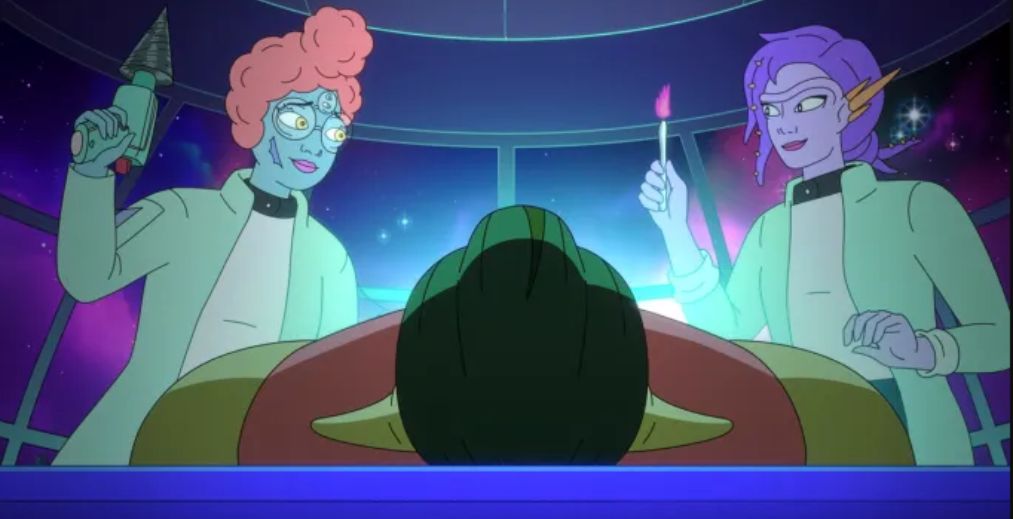
Central to The Second Best Hospital in the Galaxy‘s success is its exceptional cast, led by Keke Palmer as Dr. Klak and Stephanie Hsu as Dr. Sleech. Dr. Klak grapples with the weight of familial expectations and the burden of her own anxiety. As the series unfolds, viewers witness Klak’s struggles to assert her independence and forge her own path, all while contending with the looming presence of her overbearing mother. Klak’s journey is one of self-discovery and self-acceptance, as she learns to embrace her vulnerabilities and confront the pressures of perfectionism that have long plagued her.
On the other hand, Dr. Sleech embarks on a quest for belonging and connection in a universe that often feels cold and indifferent. Unlike Klak, Sleech lacks the anchor of familial ties, her past shrouded in mystery and isolation. Throughout the series, Sleech grapples with feelings of loneliness and alienation, yearning to find a sense of home and belonging amidst the chaos of the hospital. Her journey is one of forging connections and building relationships, as she seeks to carve out her place in a world that often seems indifferent to her existence.
While Klak and Sleech’s journeys may appear divergent on the surface, they share a common thread of seeking acceptance and validation in a universe that can be both unforgiving and unpredictable. Klak’s struggle with anxiety mirrors Sleech’s battle with loneliness, highlighting the universal nature of their experiences despite their outward differences. Both characters must confront their own insecurities and fears, ultimately learning to embrace their true selves and find solace in the connections they form with each other and their fellow hospital staff.

On that staff is a colorful ensemble of actors whose characters do just as much to enrich the series as Klak and Sleech. Natasha Lyonne’s portrayal of Nurse Tup is a standout performance that injects the show with wit, charm, and a healthy dose of sarcasm. Dr. Klak’s androgynous love interest Dr. Azel, voiced by Sam Smith, adds an extra layer of complexity to the show’s exploration of identity and relationships. Further, the introduction of Dr. Vlam, an ageless robot with millennia of existence, seamlessly complements Maya Rudolph’s comedic versatility. Dr. Vlam enriches the series’ world-building by bringing a wealth of experience from diverse fields, having traversed much of what the galaxy has to offer. While her tenure as a doctor is relatively recent, Dr. Vlam shares the same determination as Klak and Sleech, eager to prove herself in this new role.
Not to be forgotten is Dr. Plowp, voiced by Kieran Culkin. Of all the wonderful portrayals of battling self-acceptance, it was Plowp that struck the strongest cord for me. Plowp grapples with the complexities of professional success and personal fulfillment, navigating the pressures to prove himself amidst the backdrop of his species’ late puberty. His journey will likely resonate with millennials and Gen Z individuals who are grappling with similar questions of identity and purpose, offering a hopeful message of resilience and growth in the face of uncertainty. Through Plowp’s experiences, viewers can reflect on their paths and aspirations, finding inspiration and solidarity in the universal quest for meaning and fulfillment in life and work.
In essence, Klak and Sleech’s journeys, along with the rest of the cast, serve as a poignant reminder of the shared humanity that unites us all, regardless of our alien origins or personal demons. Through their struggles and triumphs, viewers are able to reflect on their own experiences of belonging and self-discovery, finding resonance in the universal themes of love, acceptance, and the search for meaning in an uncertain world. As Klak and Sleech navigate the ups and downs of life in the galaxy’s second-best hospital, they offer a compelling reminder that, ultimately, we are all on this journey together, seeking connection and understanding amidst the chaos of existence.
The Second Best Hospital in the Galaxy is the perfect tonic for the anxieties and uncertainties of modern life, offering a much-needed blend of escapism and introspection. Director Cirocco Dunlap’s keen understanding of the audience’s collective psyche shines through, offering a therapeutic journey through the absurdities of life. With its unique premise, exceptional cast, and relatable themes, The Second Best Hospital in the Galaxy stands as a testament to the power of animation in addressing complex, real-world issues. Whether you’re a sci-fi enthusiast, a working professional navigating adulthood, or someone seeking a fresh perspective on mental health, these doctors have what you need.
The Second Best Hospital in the Galaxy is streaming now on Prime Video.
The Second Best Hospital In the Galaxy
-
Rating - 10/1010/10
TL;DR
With its unique premise, exceptional cast, and relatable themes, The Second Best Hospital in the Galaxy stands as a testament to the power of animation in addressing complex, real-world issues.



